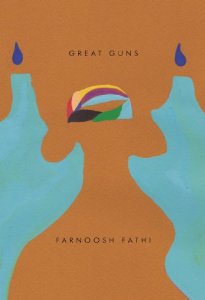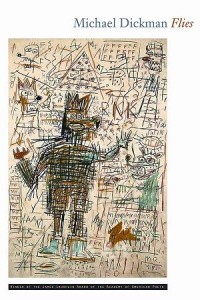Great Guns by Farnoosh Fathi
 Great Guns
Great Guns
by Farnoosh Fathi
Canarium Books. 2013
88 pages / $14 Buy from SPD or Amazon
Farnoosh Fathi’s greatly anticipated debut poetry collection, “Great Guns,” begins:
Jimmy crack corn and I don’t care.
Jimmy crack corn and I don’t care.
A light peck cracks the constellations. (3)
Immediately, the book demonstrates the gale-like sonic qualities of Fathi’s writing. It’s almost difficult to utter the words “Jimmy crack corn and I don’t care” in a way other than that of the melodic, popular folk song. For many, this tune will immediately call up the coziness of the sing-alongs of playful childhood. These earthy comforts are very suddenly shattered, however, in an ambitious, universal way when we are struck out of the familiar, almost-ingrained melody by the unexpected, “A light peck cracks the constellations.” When I read the staccato-like single syllables of “A light peck cracks the,” I can almost feel the tapping of each word. Then comes the shattered release as we flow into the multisyllabic “constellations.”
Fathi’s orchestration of sound is masterful and complicated, not unlike the contents of her poems. For example, while reflecting upon all that happens within the first three lines of this opening, untitled piece, we might ask ourselves, why “Jimmy Crack Corn”? This tune, also known as “De Blue Tail Fly,” has less-than-straightforward roots. While many readers might nestle into the memories of their childhoods, then be immediately shaken by the third line, even the song choice is infused with complexities; the origins are somewhat undetermined, but may have been rooted in blackface minstrelsy. Perhaps these first lines are a warning to heed, one regarding the intricate layers of the collection.
Despite the readability of the rhymes woven throughout Great Guns, and amidst the provisions of aural comfort they do provide, the silver-tongued speaker’s conveyances are multiplex:
the waves explode but cannot kill a snail
whose castle is the quiet
on a nun’s navel. (3)
Nothing is forbidden, yet nothing is damaged, or perhaps everything is cherished, but also broken. It’s difficult to say. Regardless, each element is handled with the care of an old, almost-omnipotent soul.
This seemingly transcendental speaker paints scenes in which the lines between we, as humans, and the rest of the natural world are not blurred, but rather seem to be intentionally blended:
Who goes, asked the pore, there on one hand so beautiful? The modern
nets and fishes out contumely; there is palsy in the grass high on noon’s shoulders. (8)
This title poem, “Great Guns,” weaves together personification, chremamorphism, and somehow even a mixture of the two techniques, which perhaps refuses to be defined. For example, “The great guns of a lover— / his sweat broke into ants that led the other way” (8).
Both nature and meaningful coalescence are common themes within this collection. Fathi writes, this time within a prose poem, of the “Iris”:
and wield it like the too-deeply green-dipped paintbrush it
resembles. The wrist aches to hold and flex it, a newly
handled thing, to air-stroke a crescent n, a crescent u, a swirl, a
figure-eight, and this playful act of no consequence is a privilege
to anyone who beholds the iris, painter or no. (41)
Yes, we desire this iris, but do we yearn for it as a flower or a paintbrush? We long to create a crescent, both an n and a u, two shapes that are identical yet opposite.
Perhaps more than many other recently published collection, Great Guns feels, to me, reminiscent of its predecessors. While reading the title poem, I find the fluid, spreading lines, as well as the way in which the speaker celebrates her lover through and among the natural world, to nod quietly toward Walt Whitman’s Leaves of Grass. Upon completing “Iris,” I am both quietly satisfied in thought and also wish to revisit Jorie Graham’s early Hybrids of Plants and of Ghosts, including “Penmanship.” Regardless of Fathi’s intentions, it would be difficult to debate that she isn’t an incredibly well read poet and an astute scholar.
I do not by any means intend to oversimplify or sterilize the accomplishments of Great Guns. Quite the contrary, it’s hard to believe this is Fathi’s debut collection. The poems manage to demonstrate the sage-like steadiness of a storyteller, yet, rather, are hauntingly lyrical. Each line glides, as if water slipping pleasurably through our fingers and then back into itself, as something we can’t quite grasp or keep. Nevertheless, Great Guns is certain to change – quite possibly deeply change – its readers for the experience.
***
Heather Lang is a poet and critic studying with Fairleigh Dickinson University’s MFA in Creative Writing program. Her poetry has recently been published by or is forthcoming within The Del Sol Review, Green Humanities, IthacaLit, Jelly Bucket and Mead. Her reviews have been published by or are forthcoming within Atticus Review, Gently Read Literature, HTMLGIANT and Prime Number Magazine. Heather serves as Assistant Editor for The Literary Review.
January 20th, 2014 / 10:00 am
Flies by Michael Dickman
 Flies
Flies
by Michael Dickman
Copper Canyon Press, 2011
96 pages / $16 Buy from Copper Canyon Press or Amazon
Upon a first reading of Michael Dickman’s Flies, a reader might be left with impressions abrupt and violent. Perhaps one cannot be blamed for this reaction; the collection oozes strangely enjambed lines and macabre content frequently addressing dark, untimely deaths. Flies, however, does much more than induce the unsettling awe an audience might expect from a horror film, although it does that, too. As a reader takes the time to know and understand the collection — perhaps not so unlike how time is necessary to begin to grieve and to start to heal — we learn that Dickman’s lines are not haphazardly clipped with the sole purpose of creating unexpected suspense and terror, but rather masterfully guide the reader with a humane, almost gentle subtlety.
Flies opens with the poem “Dead Brother Superhero.” The first lines read:
You don’t have to be
afraid (3)
Falling barely short of an end-stop, the first line, “You don’t have to be,” ever so subtly juxtaposes the state of being, via “to be,” with quite the opposite, the dead, as mentioned in the title “Dead Brother Superhero.” This comparative device, in combination with the apotheosis found within the title, results in a grievous, heartfelt magnification of the brother’s deadness.
At other times Dickman’s line breaks summon a subtle duality. In “Emily Dickinson to the Rescue”, the poet writes:
Her legs pumping
her heart
out (22)
Although the speaker states, “Her legs pumping,” perhaps a pumping heart is an even more natural image. Dickman, of course, resists this more traditional description and repetition. He does not write “Her heart pumping.” Instead the piece surprises us with “her heart / out.” Nevertheless, due to the visual layout of the stanza, it is not too far fetched to envision her heart pumping, as we the readers might even go so far as to imagine the slipping down of the verb “pumping” to substitute for that blaring white space. The audience is left with a delicate duality of sorts. We might visualize the image as written of a “heart / out,” perhaps as if wearing one’s heart on her sleeve, but there is also the quietly suggestive nod toward a heart pumping out as it might while bleeding out during the last moments of life.
The second section of the opening poem closes with the lines:
Any second now
Any second
now (4)
Dickman frequently resists more traditional forms of repetition. The phrase, “Any second now,” is repeated but with the variation of a line break. This technique creates an effect within the poem. The language itself is subtly ambiguous. Breaking the line “Any second / now” permits two reading. Firstly, we are allowed a reading identical to the first phrase without a line break, a straight repetition of what precedes. Additionally, due to the enjambement, a second meaning — that the “now” has actually arrived — is possible. If the poem stated, “Any second now / any second now,” we as readers would be left waiting with the speaker for whatever event he is anxiously anticipating. However, because the repetition is varied by the line break we may interpret the “now” both as not yet having arrived and also as having arrived. Due to the poet’s enjambment and, therefore, the emphasis of the second “now” which closes the section, we as readers can be hopeful but not certain that the awaited time has come.
September 13th, 2013 / 11:00 am
